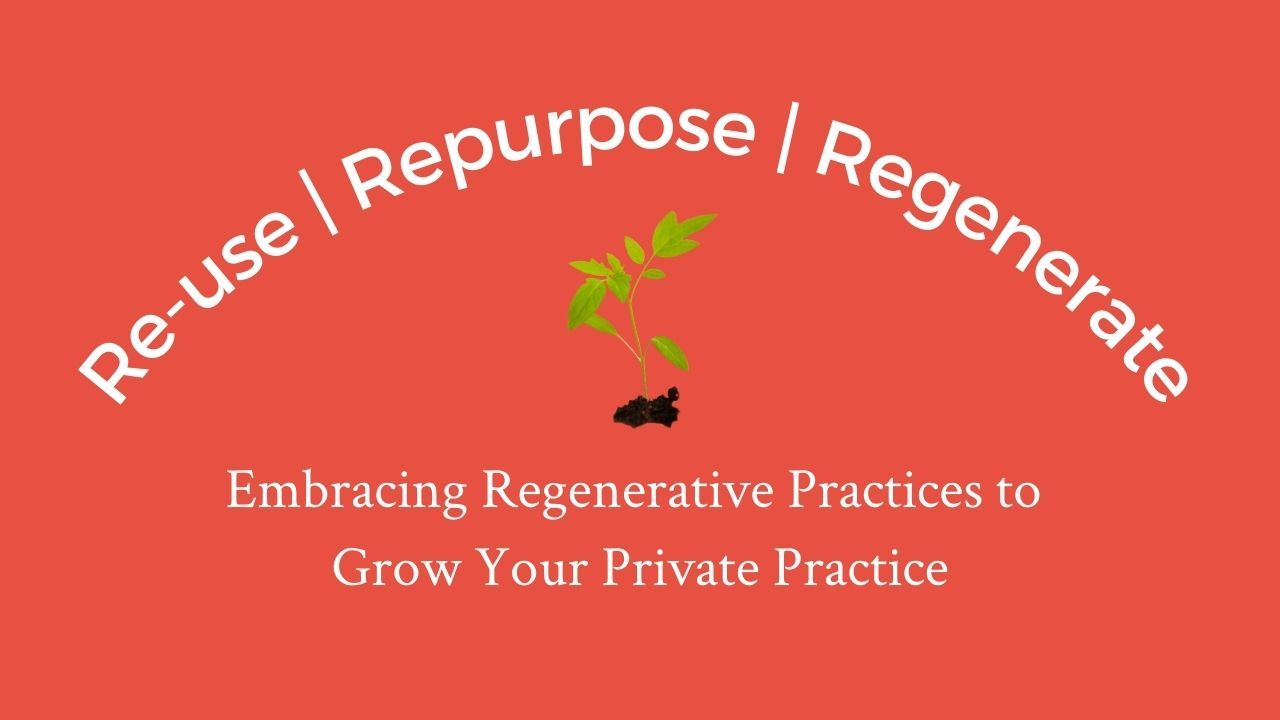
Breaking Free from the Extractive Business Model: Embracing Regenerative Practices to Grow Your Private Practice.
Feb 21, 2023In today's fast-paced business world, it's common to treat individuals as mere machines and extract the maximum productivity out of each hour. Psychologists and therapists in private practice are not immune to this "extractive business model" that often leads to overwhelm and burnout.
In this blog post, we'll explore how embracing regenerative practices can help grow your private practice and break free from the hamster wheel of constant productivity. We'll start by looking at the common practice of constantly creating new material and how tapping into our past creations can be a revelation for many. By reusing and repurposing our previous work, we can shift our focus from extraction to regeneration, from a linear economy to a circular one.
Join us as we explore the benefits of regenerative practices and how they can help you feel more rooted in your capabilities and capacity for growth.
Even as psychologists and therapists, we have mostly grown professionally within extractive business models where the approach is to treat the individual as though they’re a machine component and then extract maximum ‘productivity’ out of each hour.
For anyone doubting this is the case, one of the first things I was taught going into my first job in the UK public sector was to fill in my FAMUS sheet, making sure that I allocated as many billable hours to client projects as possible. (When I asked what FAMUS stood for, a colleague told me, ‘Fiction And Made Up Stuff.’) Every month, a manager reviewed the utility scores of each worker.
It’s therefore no coincidence that one of the biggest challenges psychologists and therapists experience even in their own businesses is one of overwhelm. When all we know are extractive ways of being in business, it can be hard to imagine what regenerative practices might look like. It’s even hard to identify the extractive practices, since they’re so ubiquitous and pervasive. They often simply look like ‘how things are done.’
However, there’s one clear example that comes up time and again for psychologists in private practice and it has a simple solution that can help you integrate a more regenerative way of being.
So many people I work with feel the pressure to constantly produce brand new work.
If they need a presentation, they make it a new presentation.
If they’re writing a programme, they start from fresh.
Every social media post is new.
And yet, every psychologist I work with has an entire wardrobe stacked with their amazing creations from the past. Journals and notepads filled with fantastic ideas and articles. Programmes and presentations jammed with in-depth learning points.
For some of my clients, it’s a revelation when I say ‘remember, you don’t have to create everything anew. You can reuse your material from the past.’
They feel like they’re cheating if they go into their cupboard fulls of treasure and use something they had in storage. And this sense of always needing to keep running on the hamster wheel to keep the machine turning is partly what drives a pervasive sense of Imposter Syndrome.
“If I stop running on this production wheel, people will find out I’m not good enough.”
Yet our knowledge stores in our practices are like the soil in a forest. A rich earth, full of the nutrients for growth. Tapping back into these and integrating our store of knowledge into our work allows us to grow more regeneratively: reducing the demand for energy; linking us with our past selves and helping us to feel confident in our ability to keep growing.
We realise that we have strong roots buried in rich earth of experience and expertise. We don’t need to keep running on the wheel. We are enough already, we have enough, and we can also share what we have already created.
“By shifting our economy from linear to circular, we shift the focus from extraction to regeneration.” Ellen MacArthur Foundation.
Going back to our own stores of knowledge and integrating this as a principle of our private practices allows us to make a shift from extraction to regeneration, from a linear economy to a circular one. We can feel more rooted in our capability and capacity for growth rather than continually feeling like an imposter.
Re-use
Repurpose
Regenerate
We can be the change we want to see.
Join the movement towards a more sustainable and regenerative approach to private practice by integrating this principle into your work. Let's shift our economy from linear to circular and focus on regenerating our knowledge stores to promote growth and sustainability.
Together, we can break free from the extractive business model and embrace a more regenerative future.
Ready to build something bigger than just a 1:1 caseload?
You’ve done the groundwork. Your private practice is up and running, but you know you’re capable of more. More impact. More creativity. More freedom.
The Psychology Practice Accelerator (TPPA) is a 6-month programme designed for psychologists who are ready to evolve beyond the traditional model. You’ll learn how to diversify your income, shape offers around your strengths, and grow a business that reflects your purpose and potential.
Our next cohort begins September 2025. If you're curious about what's possible when you stop playing small, join the waitlist to be the first to hear when enrolment opens.

